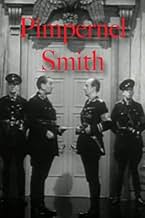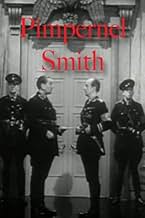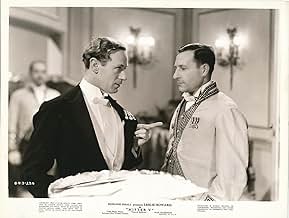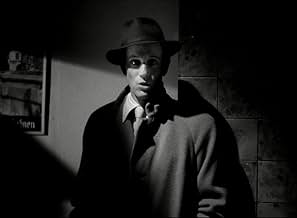अपनी भाषा में प्लॉट जोड़ेंProfessor Horatio Smith, while seeming very unassuming, rescues victims of Nazi persecution during World War II.Professor Horatio Smith, while seeming very unassuming, rescues victims of Nazi persecution during World War II.Professor Horatio Smith, while seeming very unassuming, rescues victims of Nazi persecution during World War II.
- पुरस्कार
- कुल 4 जीत
- General von Graum
- (as Francis Sullivan)
- Clarence Elstead
- (as Lawrence Kitchen)
फ़ीचर्ड समीक्षाएं
Francis Sullivan is General von Graum, the head of the gestapo. He's not a dumb Nazi, but cunning and committed. The large cast includes college students, scientists, underground characters, German soldiers, gestapo men and others. All of the cast are very good in their roles.
Other reviewers discuss the story and actors. Those who are interested in the background of the film and its significance for the time may like more information. The following is a brief overview.
Baroness Emma Orczy de Orci was still alive in 1941 when Leslie Howard and British National Films made this movie. "Pimpernel Smith" borrows its plot, and part of its name, from de Orci's 1903 play and 1905 book. "The Scarlet Pimpernel" was a big hit. In 1934, Howard played Sir Percy Blakeney in the movie of the same title that set the standard for all film versions to follow. Indeed, all but the 1982 TV film with Anthony Andrews in the role, pale in comparison.
In 1940, De Orci had just written the last of a dozen sequels to her original. In the meantime, Scottish author A.G. Macdonell had written a story, "'Pimpernel' Smith," that brought the famous rescuer up to the time of World War II. One wonders if Macdonell, Howard or others consulted de Orci about the 1941 film. Did Howard correspond with her about it? Would she have approved and been pleased?
Howard was interested in a rescue type film against Nazi Germany as early as 1938. After Macdonell's modern "Pimpernel Smith" came out, Howard made this film his project, from start to finish. He co-produced, directed and starred in it. Besides being a first-rate wartime thriller, "Pimpernel Smith" is one of the best propaganda films ever made. It was highly regarded as such from its opening early in WW II.
The movie was released in Great Britain on July 28, 1941, and around the rest of the U.K. in the days that followed. It wasn't released in the U.S. until February 12, 1942, after America had entered the war. But it was a big success there as well as in the U.K. It was the third most popular movie in England in 1941. In the U.S. it was released under the title, "Mister V."
"Pimpernel Smith" may have inspired Sweden's Raoul Wallenberg, whose efforts in 1944 saved many thousand Hungarian Jews from Nazi death camps. Wallenberg's story has been told in several documentaries and two movies. "Wallenberg: A Hero's Story" was a 1985 Paramount movie made for TV. "Good Morning, Mr. Wallenberg" is a Swedish film from 1990.
When "Pimpernel Smith" reached Sweden in November 1943, it was banned by the Swedish Film Censorship Board. The Swedes feared for their continued neutrality during the war because of the portrayal of the Germans in the movie. But, Wallenberg and his sister saw the film at a private screening. She later said that he was impressed by the movie and said he would like to do something like that. Since 1941, he had been traveling frequently to Hungary as a businessman. By 1944, he would be a special envoy for Sweden to Hungary, as well as a contact for the American OSS. He made it his mission to help save Hungarian Jews.
Wallenberg did save many thousand Austrian Jews by giving them Swedish passports and secured housing. But, his fate is unknown. After the Soviet Army took Budapest in 1944, Wallenberg disappeared. He was summoned to Soviet headquarters and was never heard from again. The later movies, books and articles conjecture about his final end. While no one can be sure, and actual evidence has never surfaced as to when or how he died, there's no doubt that he died or was killed while a prisoner of the Soviet Union.
And, Leslie Howard himself would not survive World War II. Howard was too old for military service - he was 46 at the start of WW II in 1939. But, he worked feverishly in his trade against the Nazis. He made several documentaries and starred in a number of World War II films. His other films included "49th Parallel of 1941, "Spitfire" (aka, "First of the Few") of 1942, and "The Gentle Sex" of 1943.
After his last film in America - "Gone With the Wind" of 1939 (in which he plays Ashley Wilkes), Howard returned to England to help with the war effort. But, he was killed on June 1, 1943. He was one of 17 passengers on KLM Royal Dutch Airlines/BOAC Flight 777. It was enroute from Lisbon, Portugal, to Bristol, England, when German fighters shot down the DC-3 over the Bay of Biscay. The plane was off the coast of France, 500 miles West of Bordeaux.
Leslie Howard is one of the great film and stage actors of all time.
Howard was given a second chance to play the same character in a modern setting, as an underground agent working against the Nazis on their own soil. The script, direction, and acting are all superb. The only negative is that this film TAKEN ON ITS OWN might seem contrived and over-written. Unless - THIS IS THE KEY -- you see the original first. Remember that this was the era before 500 cable channels and streaming video. It is a 'given' that the audience for this film was familiar with the first. So if you you follow their footsteps and see the films in proper order, the sheer bravado and outrage within this script will pop, and you will enjoy a tremendously entertaining film by a master at the top of his craft.
In particular, the exchanges between Howard and his nemesis, played by Francis L. Sullivan, and are the stuff of legend.
And the scene where Howard, playing a die-hard bachelor, shows a photo of his lifelong love (the statue Aphrodite) to the character played by Mary Morris and then tears it up in front of her ... remains one of the most romantic scenes ever films. A declaration of love with no words spoken.
The pity is that being B&W this film will have a smaller and smaller audience in years to come. Pity.
((Designated "IMDb Top Reviewer." Please check out my list "167+ Nearly-Perfect Movies (with the occasional Anime or TV miniseries) you can/should see again and again (1932 to the present))
What makes this movie is not the plot, but the little subplots that surround the movie. You cannot watch this movie just once; it takes several times before you catch all the subtilties. Leslie Howard is just full of them in this movie.
But even more interesting is the character development. We watch Professor Smith go from a hardened academic to a gentile, but compassionate man. We watch the students go from being boys to men, and we learn from Ludmilla Koz about what kind of courage a lady can have.
By all means, watch this movie and watch it a lot. It will teach you in many ways.
In The Scarlet Pimpernel Howard is a Georgian fop as his cover for the dashing, unknown, and elusive pimpernel. Substitute fop for tweedy as he's now an Oxford archeology professor and his cover is a beaut.
One of the Nazi Aryan racial vanities was that way back in the day there was an Aryan civilization. Being the archaeologist he is, Howard's cover is that he's in Germany on a dig, looking for evidence of that selfsame civilization. He even brings along several students as part of the cover.
In one scene Howard is wounded when he's disguised as a scarecrow and a Nazi guard shoots at it to make a point. That does lead to him being found out by his students, one of them being David Tomlinson, later the father in Mary Poppins. To a man, they all decide to stay and help him with his work.
Howard's a bachelor here so he doesn't have wife Merle Oberon and her family dirty laundry to compromise him as he did in The Scarlet Pimpernel. Here he's dealing with Mary Morris who is collaborating with the Nazis to keep her musician father, Peter Gawthorne alive.
Taking the place of Howard's relentless foe Chauvelin as played by Raymond Massey is Francis L. Sullivan as General Von Graum of the Gestapo. Sullivan is a favorite character actor of mine and a joy to watch in any film he does whether a good guy or the baddest of bad guys as he is here.
Leslie Howard directed this film himself and it's interesting to speculate had he survived World War II whether he would have done more work behind rather than in front of the camera. In directing Pimpernel Smith, he certainly had the advantage of knowing his character well.
And you shouldn't pass up an opportunity to get to know him too.
Leslie Howard, of course, makes or breaks the whole. As producer, director and starring actor, his name is scrawled - literally - on the film from its opening titles; indeed it gives us a chance to recognise the penmanship on the mysterious hand-written notes that recur! Unsurprisingly, in some ways this is very much a one-man vehicle. If Leslie Howard's charms escape you, the whole production is probably a dead loss - but for any fan of his earlier films, it is little short of unalloyed delight.
"Pimpernel Smith" takes much of its resonance from the subtle parallels with Baroness Orczy's story of the Scarlet Pimpernel. The latter is openly referred to only in the title, but acknowledged in a dozen ways, from the leading character who cloaks an incisive mind beneath a foolish mask to the young acolytes who aid and yet rashly put him at risk, the woman who is set to spy out the identity of a beloved one's potential saviour, and of course the closed frontiers and despotic arm of a new-fledged state - not Revolutionary France, but a Nazi Germany not yet at open war. Above all, the echoes lie in the ingenious guises and plans for escape, always one twist ahead of both the enemy and the viewers themselves. By the end of the film, I was suspecting the most innocent characters of being the nondescript Professor Smith in disguise... and I'm still not certain about the indignant lady on the Cook's Tour!
The references, however, are never obtrusive and always remain subtle; and of course perhaps the chief of these is the casting of Leslie Howard himself. Along with a humane and intelligent script, it was his outstanding depiction of the title role that raised the 1934 film of "The Scarlet Pimpernel" above the average. Even today, the association is immediate. Less than ten years after the original, the dual performance of their star must have been inescapable.
From vacuous fop to absent-minded professor... and yet it is to Howard's credit that his Professor Smith is not a carbon copy of Sir Percy Blakeney, but a distinct and undoubtedly charming character in his own right. For a moment, rapt in admiration of an Aphrodite, he is startlingly handsome. But for the most part, peering owlishly over a newspaper or buried beneath a deplorable hat, he is more the living spit of bespectacled Charles Hawtrey in some post-war "Carry On". He has developed the baggy amble to a fine art, and the knack of deprecation and inoffensive insolence almost without effort; and the role of gentle academic is not a pose, but the guiding principle behind all his unlikely impersonations, even that of the part of hero. The Professor, above all, is a man who hates destruction and waste.
Passionate screen kisses rarely move me; oddly enough, a handful of restrained moments of tenderness in this film did. It may be a carefully-scripted star vehicle, but few enough of those choose to celebrate the clever and the unassuming. I like Professor Smith very much indeed.
But even the quietest hero needs a villain as foil, and Francis L. Sullivan is also outstanding here as the elephantine von Graum, a Nazi general who turns out to be far less stupid than one might assume. It's hard not to suspect the character of being a lampoon on Goering, and from the start we are invited to laugh at him; but for all his girth and his struggles with "the English sense of humour", von Graum is brighter by far than most of his staff, and sometimes even one step ahead of the viewer, which makes it hard to be complacent on our heroes' behalf. He may rant and foam for lack of proof, but the net is tightening... and without the advantage of Orczy's predetermined plot, the unexpected twist at the end of this film could all too easily go either way. Unfortunately, heroism is not necessarily defined by survival...
In fact, in retrospect, I feel that the ending (which I won't reveal here) was perhaps the one weak point. Unlike the Basil Rathbone wartime pictures (there are echoes of "Pimpernel Smith" in the subsequent, not at all bad, "Sherlock Holmes and the Secret Weapon"), the anti-Nazi sentiments of the hero's set-piece speech are not dated or tendentious to modern ears. Indeed, Leslie Howard's shadowed intensity remains one of the most effective shots in the film. The only trouble is that it's so good that it becomes a hard scene to top, and the actual finale comes off as somewhat trite by comparison.
But that's with hindsight. At the time, the only thing of which I was fully conscious was that, already pre-disposed in that direction by "The Scarlet Pimpernel" and "Pygmalion", I had just become a raving Leslie Howard fan! Every time I catch myself whistling 'Tavern in the Town' without thinking, over the next few days, I shall know why... and smile.
क्या आपको पता है
- ट्रिवियाOne of the earliest movies to openly and unflinchingly discuss Nazi labor, concentration, and death camps.
- गूफ़At the reception in the English embassy, Professor Smith misquotes Lewis Carroll's Jabberwocky. He mispronounces "borogoves" in the third line of the poem as "borogroves".
- भाव
General von Graum: But we have one problem. "To be or not to be?" as our great German poet said.
Professor Horatio Smith: German? But that's Shakespeare.
Professor Horatio Smith: But you don't know?
Professor Horatio Smith: Why, I know it's Shakespeare. I thought Shakespeare was English.
General von Graum: No, no, no. Shakespeare is a German. Professor Schuessbacher has proved it once and for all.
Professor Horatio Smith: Oh dear, how very upsetting. Still, you must admit that the English translations are most remarkable.
General von Graum: Good night.
Professor Horatio Smith: Good night. Good night. "Parting is such sweet sorrow."
General von Graum: What is that?
Professor Horatio Smith: One of the most famous lines in German literature.
- क्रेज़ी क्रेडिटImmediately following the opening credits: "The tale we are about to unfold to you is a fantasy. None of its characters are living persons. But it is based on the exploits of a number of courageous men who were and are still risking their lives daily to aid those unfortunate people of many nationalities who are being persecuted and exterminated by the Nazis. To these champions of freedom this story is dedicated."
- इसके अलावा अन्य वर्जनThis film was cut and retitled 'Mister V' for its first American release in the early 1940s. Some versions censor the response from Hugh McDermott's character "I'd do my damndest..." in response to a question posed by Leslie Howard's character at a table in a café.
टॉप पसंद
- How long is 'Pimpernel' Smith?Alexa द्वारा संचालित
विवरण
- रिलीज़ की तारीख़
- कंट्री ऑफ़ ओरिजिन
- भाषाएं
- इस रूप में भी जाना जाता है
- Mister V
- फ़िल्माने की जगहें
- D&P Studios, Denham, Uxbridge, Buckinghamshire, इंग्लैंड, यूनाइटेड किंगडम(as D & P Studios Denham . . . England)
- उत्पादन कंपनी
- IMDbPro पर और कंपनी क्रेडिट देखें
- चलने की अवधि2 घंटे
- रंग
- पक्ष अनुपात
- 1.37 : 1
इस पेज में योगदान दें

































